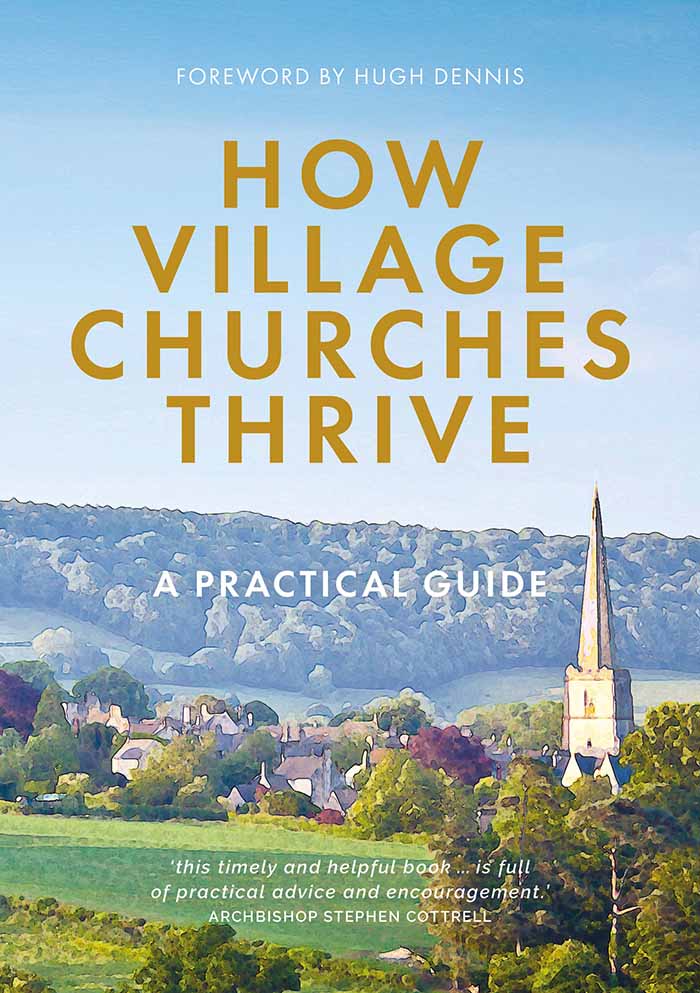Canon Dr John Rees, the former registrar for the Diocese of Oxford, shares his thoughts on a new book, How Village Churches Thrive: A Practical Guide, from the Rt Revd Robert Atwell, Gill Ambrose and Helen Bent.
This inspiring handbook forms an integral part of a series of events for small and rural churches in the Diocese of Oxford this autumn, and parishes attending will receive a free copy. Find out more here, and read John's review below.
 How Village Churches Thrive
How Village Churches Thrive
What an intriguing title! Is it simply a contradiction in terms? A nostalgic look through the rear-view mirror? No more than whistling in the dark? Or, as the Bishop of Exeter suggests, a vital reminder that ‘small churches are not failed large churches’?
In a series of ten pithy, eye-catching sections, beautifully illustrated and graphically described, the authors address the demanding issues presented by declining numbers, financial challenges, ancient buildings and media stereotypes – and come up smiling (though sometimes, you suspect, through their tears). It would not be difficult to dismiss their analyses and suggestions as simply naive – were it not for the case studies that accompany each section. These people are not anybody’s fools.
From loneliness to lichen
What is particularly compelling about each section is their lack of drama and hyperbole. They know that sometimes a sandwich board outside the church on Sundays may get a better response from passers-by than a website that hasn’t been updated since last Harvest Festival. Who has the courage to ask parishioners what they think the church is there for? Is there any point in asking the people in the pews? Maybe there is – but what about the people in Acacia Avenue, who may well have entirely different ideas?
‘God’s Acre’, and the importance of lichen; isolation and loneliness; jargon (who outside the Church’s cognoscenti talks about ‘occasional offices’ without thanking God for working from home and the chance to avoid the daily commute?). Who knew about InfoPoint ('a standalone device that broadcasts a standard wireless signal compatible with the private smartphones and tablets of visitors’)? I didn’t! But they’re all here, and much more.
Above all, the situations described in the case studies all remind us of people we recognise in our own congregations. These are the people who faithfully welcome regulars and newcomers, who live their lives embedded in their communities and whose commitment has something to do with the God who made them.
In my experience they are open to any practical ideas for doing more of the same, and maybe better – sustained by the idea that somehow what they are doing has something to do with the God who made them, their families and their friends, and will see them through thick and thin. They’d be embarrassed to put it any higher than that.
Reaching the 'Alans'
Reading this book I was reminded of a parishioner in the parish I served as a curate in Leeds 40 years ago. He could often be found at odd hours of the day (and night), strimming the grass round the gravestones in the churchyard (a bit of a surprise when I first saw sparks flying from the stones just before midnight on one occasion!).
One day, Alan (as I’ll call him – not his real name) told me that he couldn’t make head or tail of his wife’s religious enthusiasms, and felt deeply uncomfortable when he attended church on Sundays – but that he felt a closeness to God that he couldn’t put into words when he was out in the churchyard with his strimmer.
There are any number of ‘Alans’ among the overwhelming number of our parishioners who don’t often come into our buildings on Sundays, and this book might help us to engage with them – for their souls’ good, and, not least, ours. Not every small church will have the people to implement all these suggestions, but that’s not the point. Hardly any parish will have no-one in the congregation or in the wider community who has nothing to offer as their response to the breathtaking generosity of God.
The comedian Hugh Dennis (whose father, as it happens, was our bishop in Leeds all those years ago) commends this book in his foreword far better than I could manage:
"I hope that it might inspire and help you identify simple ideas to involve people of all ages in building a welcoming, long-lasting and thriving church community."
Canon Dr John Rees
The Diocese of Oxford's rural programme kicks off this September with a Rural CMD Day and the inaugural diocesan lecture. Copies of How Village Churches Thrive are available for free to parishes attending either of these events.
